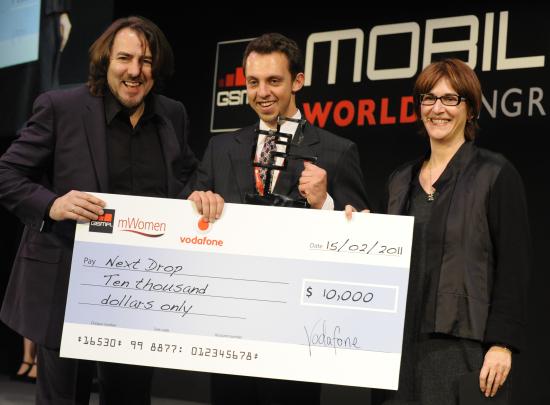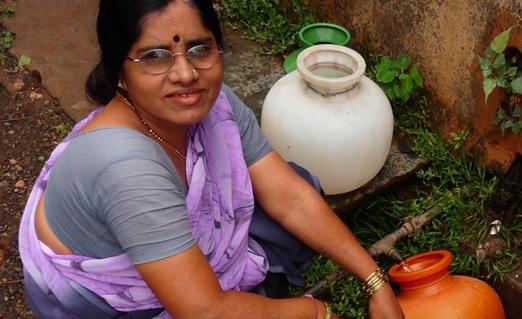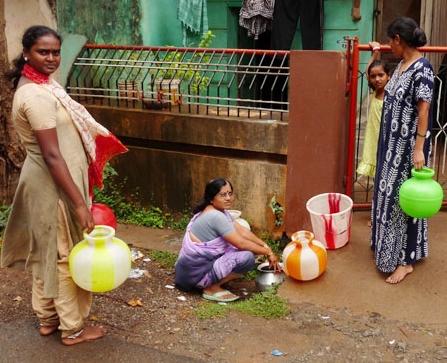School of Information master's student Thejo Kote and his teammates are the winners of the inaugural GSMA mWomen BOP App Challenge, awarded for a mobile phone application to meet the specific needs of women in developing countries.
Their project, NextDrop, addresses the challenge of unreliable piped water in developing countries by providing households with reliable, near real-time information about water arrival via the mobile phone infrastructure.
The $10,000 prize was awarded yesterday at the Mobile World Congress, the mobile industry’s premier event, in Barcelona, Spain. The contest was sponsored by the GSM Association, the worldwide organization of mobile operators and related companies, and mWomen, a new initiative to increase mobile access to women in the developing world for their socio-economic advancement.
In almost all of the cities in South Asia and at least a third of those in the rest of Asia, Africa, and Latin America, families wonder every day whether they will have water. These millions of households have a piped water supply; however, water is only available through these pipes for a few hours at a time. Due to the pervasive unreliability of piped water supplies in developing countries, households lose immense amounts of time waiting for water to arrive, with the costs borne disproportionately by women and by the poor.
NextDrop promises households accurate and timely information about local piped water delivery, over cell phones already widely in use in India. This information comes from water consumers themselves. Participants receive micro-payments in exchange for calling the NextDrop system when water begins to flow in their locality. NextDrop verifies this information and then pushes announcements to other subscribers nearby. The project also uses this data to predict when water will arrive in nearby geographic areas.
“In terms of technology, this is not anything groundbreaking — the water boards just don't have the capacity to do it themselves,” Kote said. “I think it would be great if NextDrop becomes irrelevant, but I don't think this is going to happen anytime soon.”
In addition to Kote (MIMS '11), the project team includes civil engineering master's student Anu Sridharan; Emily Kumpel, a Ph.D. student in civil engineering; Ari Olmos, a Berkeley public policy master's student, and Ashish Jhina, an MBA student at Stanford University. They are advised by I School assistant professor Tapan Parikh, a leader of the school's program in ICTD (Information and Communication Technologies and Development).
The idea for NextDrop was hatched in a fall 2009 School of Information course taught by Parikh. The course, Social Enterprise for International Development, trained students to create social enterprises for rural developing regions, using information and communication technologies. According to Parikh, the course is one of a kind. “Other courses have addressed engineering and product development challenges in developing countries; however, this is the first course that focuses on integrating information technology innovation and entrepreneurship for development,” he said.
At the conclusion of that course, the student groups presented their business plans for a panel of expert judges, who awarded a $5000 travel grant to the NextDrop project to pursue their business plan. Since then, the NextDrop project has also won the Clinton Global Initiative University award for outstanding commitment and the CITRIS "Big Ideas" award.
Applicants for the GSMA mWomen BOP App Challenge were evaluated by a distinguished panel of judges from worldwide telecommunications, design, and investment companies. Judges included Ken Banks, founder of kiwanja.net; Jan Chipchase of Frog Design; Rebecca Parsons, CTO of ThoughtWorks; Jenny Aker of Tufts University; Valerie Rozycki, founder & CEO of ZipDial; Lee Epting and Hermant Madan of Vodafone; Rina Shainski, general partner of Carmel Ventures; Chris Locke, managing director of the GSMA Develepment Fund; and Amy Klement, vice president of Omidyar.
The challenge was two-tiered; NextDrop was awarded the prize in Tier 1, for apps designed for low-end devices or feature phones.
“The real advantage of the NextDrop approach is its simplicity,” explained Parikh, “in particular, the use of SMS [text messaging] as a low-cost tool to both inform and empower.”
“Hundreds of millions of people live with intermittent piped water in cities throughout the developing world,” Olmos explained as he accepted the award yesterday. “Women, in particular, lose immense amounts of time waiting for water. We will use this award to take NextDrop forward and reach more families with timely, accurate water availability information.”












